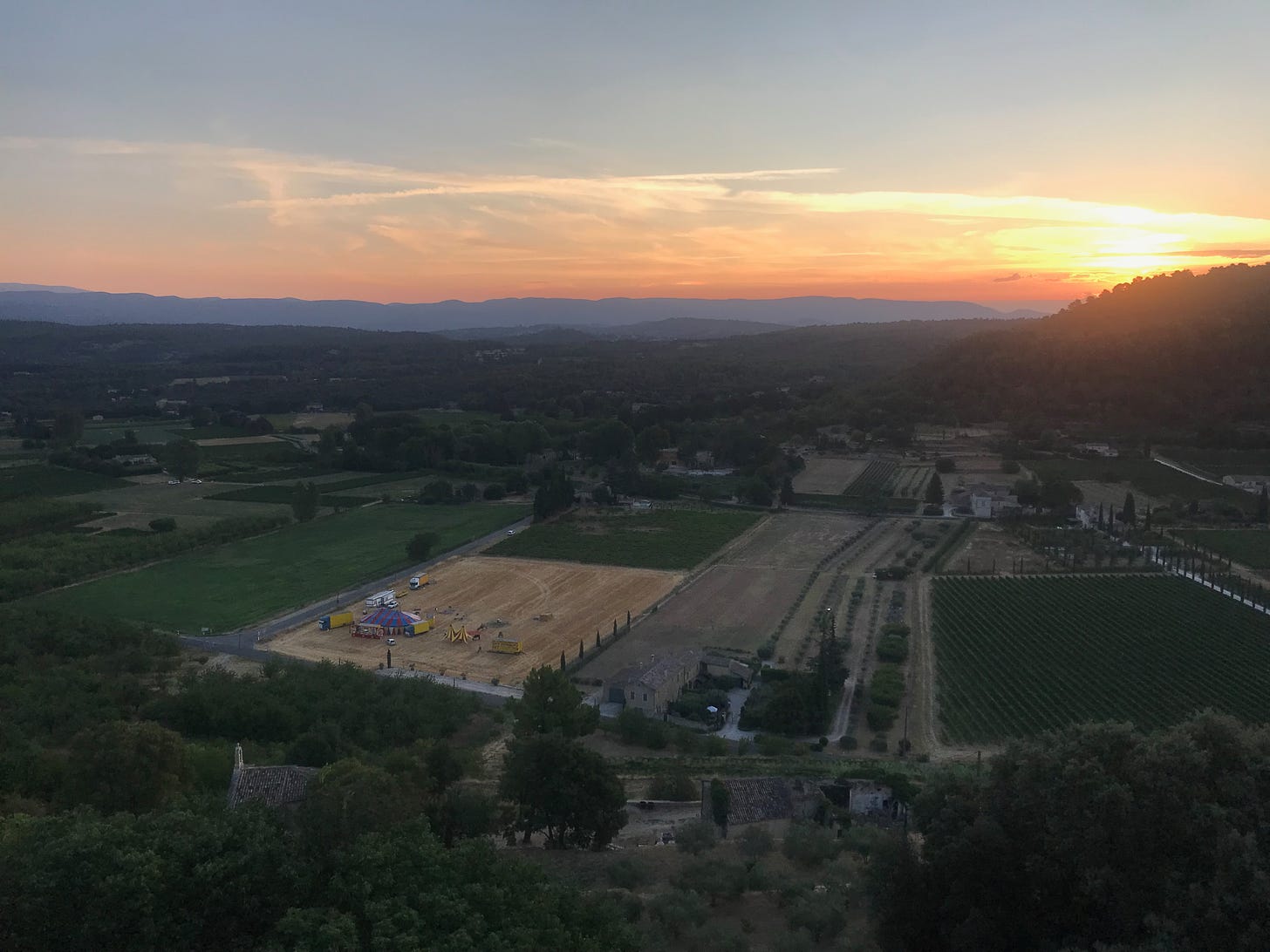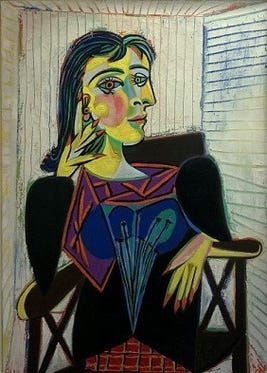On biography and ghosts
Did I sense a spirit presence in an old Provençal house? Or was it just my own unquiet mind?
Welcome to my new subscribers! I’m glad you’re here. This email comes out once a month. Otherwise, find me on Twitter, Instagram, or (if you must) Facebook.
Do you have questions about Anne Frank that you’d like me to answer in future installments of this newsletter? Please reply to this email or tweet them to me.
What I’m working on
I had the great fortune of spending much of the month of August at the Maison Dora Maar, an ancient stone house perched high atop a hill in the village of Ménerbes, in Provence. Ever since a colleague told me about this residency years ago, I had longed to participate. My desire to travel intensified during the pandemic, when the pressures of Zoom schooling and the inability to make long-term plans meant that I had less reliable writing time than ever. A few weeks alone with my book about Anne Frank seemed an impossible dream.
The house—given to Dora Maar by Picasso, her onetime lover, after he abandoned her—was even more beautiful than I had imagined it to be, outfitted with antique furniture and textiles in muted patterns. The windows of my workspace looked out toward Mont Ventoux, the valley below a festival of green and gold fields. I took long walks on the roads winding through the hillsides, watching tiny lizards scamper along the rocks.
Yet something did not feel right to me about the house. It might just have been the weather: the temperature rose every afternoon into the nineties and higher, and even the heavy stone walls could not keep out the fierce sun. We were told to close the wooden shutters during the day and open them to let in the cool night breezes, but the heat remained oppressive well after dark. I slept fitfully, never more than a few hours at a stretch, often awakened by the village clock tower chiming the hour with a dissonant clang—and then again, perversely, two minutes later, like a medieval snooze alarm. (Anne Boyd Rioux explains this phenomenon here.)
When I was working on my Shirley Jackson book, people often asked if I believed in ghosts. Shirley claimed that she didn’t, but she wouldn’t entirely close that door. “I have always been interested in witchcraft and superstition, but have never had much traffic with ghosts, so I began asking people everywhere what they thought about such things, and I began to find out that there was one common factor,” she once wrote.
“Most people have never seen a ghost, and never want or expect to, but almost everyone will admit that sometimes they have a sneaking feeling that they just possibly could meet a ghost if they weren’t careful—if they were to turn a corner too suddenly, perhaps, or open their eyes too soon when they wake up at night, or go into a dark room without hesitating first.”
That was precisely how I felt as I tossed and turned in my tastefully appointed bedroom, watching the shadows. I started getting up earlier and earlier, arriving at my desk at 5 a.m., with Venus still visible above the mountains. I was immersed in a particularly intense section of my book: the chapter about Anne’s rewriting of her diary during her last few months in hiding. By evening, I was exhausted and could write no longer, but sleep still was impossible. When I closed my eyes, I saw the face of fifteen-year-old Anne—not the sweet schoolgirl whose image we all know so well, but as she really was in the Annex, where no photographs of her were taken: taller, with a woman’s body, her hair grown longer, her nearsighted eyes squinting. (Anne’s eyesight deteriorated while she was in hiding; her parents considered sending her out to an eye doctor, but decided it was too dangerous.) I saw her sister, Margot, as well, moonfaced and serene.
Was my mind, under-rested and maniacally churning out words to meet my daily writing quota, growing unfocused? Or were there strange vibes in the house? In the library I found a book about Maar by James Lord, who met her and Picasso in Paris shortly after World War II and eventually became acquainted with her. She was a gifted photographer and painter who had also been Georges Bataille’s lover, but after Picasso left her, when she was still in her thirties, she spent the remaining decades of her life largely in isolation, much of it in the extraordinary house where I was staying, which she allowed almost no one to enter. Lord, visiting her there, described the building as dilapidated and crumbling, barely furnished, the rooms above the ground floor mostly closed off and unused, and their proprietress mercurial and eccentric, with an imperious attitude and a lilting, bird-like manner of speech.
More a memoir than a biography, the book both fascinated and annoyed me. Though Lord spent weeks with Maar at a time, he failed to persuade me that there was any real intimacy between them. He found her arrogant and intimidating; twenty years older than he, she kept him at a distance, treating him more as a child than a peer. His interest in her seems to have been based almost entirely on her proximity to Picasso, whom he adulated; he did not take her art seriously. The reader sees this mysterious and tormented woman almost entirely through Lord’s eyes, with the benefit of few other people’s perspective. (He does, horrifyingly, quote Picasso: “Never known anyone so—what can one say?—so convenient. She was anything you wanted, a dog, a mouse, a bird, an idea, a thunderstorm. That’s a great advantage when falling in love.”) And what a betrayal that he published this memoir—which contains intimate details about her mental health and absurd speculations about her sexuality—while she was still alive!
That’s how I felt about Lord’s book, anyway, during those unhinged hours of the night. In the morning, pounding away at my keyboard in one of those rooms Maar kept closed up, I wondered—not for the first time—how much more justifiable it could be to betray the dead. I would look up from my desk to imagine Anne perched on the elegant little sofa opposite, her legs curled up underneath her. How dare you? she asked as I flipped the pages of the Critical Edition of her diary, transcribing words she never intended to see the light of day: the childish first draft, part of which is written, fan-fiction-style, in homage to the Dutch YA novelist Cissy van Marxveldt, her favorite writer; her agonies over whether Peter van Pels, the teenage son of the family in hiding with the Franks, reciprocated her feelings for him. You know I didn’t want to publish all that. (For more on Anne’s rewriting of her diary, click here.)
Janet Malcolm famously imagined the biographer as a burglar, “breaking into a house, rifling through certain drawers that he has good reason to think contain the jewelry and money, and triumphantly bearing his loot away,” and the reader as his accomplice, “tiptoeing down the corridor together, to stand in front of the bedroom door and try to peep through the keyhole.” Yet Malcolm, too, was a biographer, as well as a brilliant journalist who specialized in unearthing secrets, both personal and textual. I imagine she justified her work to herself the same way I do, when a cooler head prevails: that to pay close attention to a person, to try to see them as they really were, is to show them the greatest respect.
I named this newsletter “Ghost Stories” after giving a talk at a conference on “Gothic spaces” in which I argued that biography itself is a haunted house. “Every biography is a kind of ghost story,” I wrote, “told by a person who strives for communion with an inaccessible other.” Sometimes I think that what we call “ghosts” might be a manifestation of our fear that the dead are still capable of hurting us (which, of course, they are, albeit not physically). Or just our inability to reckon with the fact that they are truly beyond our reach.
Near the end of my visit, I learned that the land where the Dora Maar House now stands was the medieval Jewish ghetto in Ménerbes. Maybe the weirdness I was experiencing had nothing to do with Dora after all! I asked one of the students working there whether there was any speculation about the house being haunted. “Why,” she asked, “have you seen anything?” Apparently I wasn’t the first. The house, she told me, had been treated with sage more than once—which I did not find particularly reassuring. Perhaps it was due for another deep cleaning.
Where I’ll be
Coming up next week: my first in-person Shirley Jackson–related event since the pandemic started! On November 2, I’ll be reading from my book and discussing Jackson at the University of Rochester. Superfans know this as the place where she met her French friend Jeanou and had some of the experiences that made their way into Hangsaman, before flunking out. More info here—it’s free.
On November 6, I’m doing a Zoom talk about Jackson for the Last Tuesday Society, a London-based organization specializing in the occult. I wish I could visit the Victor Wynd Museum of Curiosities, Fine Art and Natural History in person, but this will have to do.
On November 9, I’m reading from Virginia Woolf’s diaries at a special event at the New York Public Library celebrating a new exhibition of Woolf’s manuscripts and the opening of an opera adapted from The Hours, Michael Cunningham’s novel about Woolf. Free tickets available here.
And on November 17, at the Center for Fiction in Brooklyn, I’m in conversation with the marvelous Andrea Barrett about her new collection of short stories, Natural History. This one is both in-person and on Zoom: sign up here.
What I’m reading
I made it through only two episodes of “The Watcher.” Is it worth hanging on for more? But—of course—I loved Nathan Munn’s essay in Popula about his haunted apartment. “Hope our website isn’t haunted now,” the magazine tweeted. So do I.
As ever,
Ruth
“No live organism can continue for long to exist sanely under conditions of absolute reality; even larks and katydids are considered, by some, to dream.”—Shirley Jackson, The Haunting of Hill House





Hi, Ruth. Happy to find your newsletter and hear about your Anne Frank project. Two things: For another ghost story, see the opening section of Jessa Crispin's rather provocative "My Three Dads." Also: Sorry I'll miss your library gig next week; I'll be in NY but have theater tix that night. Please give my best to Joyce DiDonato, whom I profiled a decade or so ago.